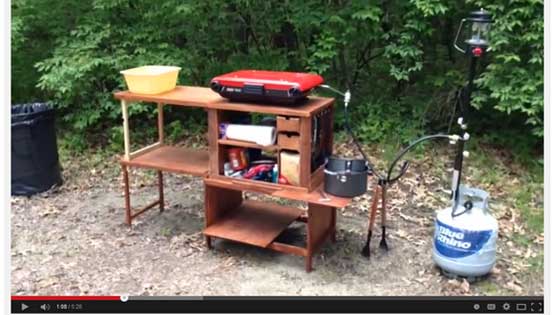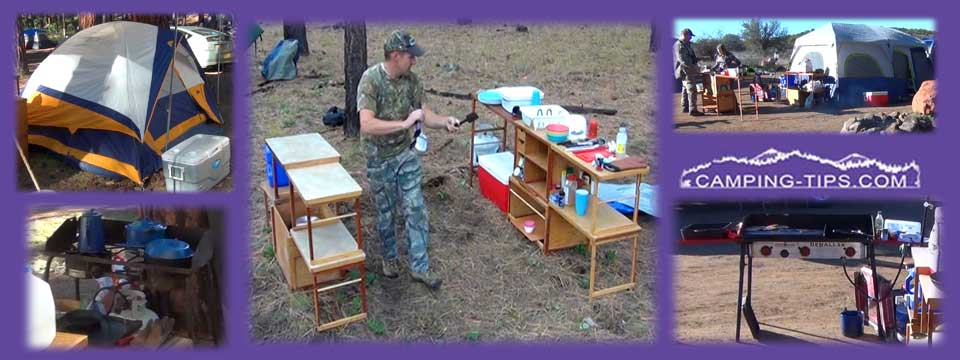
Camping Gear and Equipment
The general tent camping equipment mentality.
The key with tent camping gear and equipment is the more you have, the more you have to bog you down. Like any possession, it owns you just as much as you own it. Personally, I prefer to apply the backpacker mentality when acquiring camping equipment. The object of the game in backpacking is to have exactly what you need, no more no less. In roadside tent camping our vehicle carries our equipment for us but we still have to find a place to store it, load it, unload it and just deal with it in general. Therefore, the old saying of "less is more" truly does apply here. I am even going to suggest that the less camping gear and equipment you have the more you will go camping.
Having said that, it is still important to have what you need when you need it. Thus a significant amount of equipment can be required for those occasions where you have a lot of people and/or are camped remotely for and extended period of time. The kind of gear you chose to acquire is largely an issue of personal preference and a compromise between cost and quality.
So the question becomes what do we actually need for tent camping? Basically there are three areas of consideration one must examine when acquiring camping equipment:
- Body maintenance items
- Shelter and sleeping (the house)
- Food and water ( the camp kitchen )
Body maintenance items and concerns
Clothing is probably the easiest item to over and under do. It must be appropriate to the given season, conditions and activities. How it facilitates retention or dispersion of ones body heat and moisture are paramount issues. This is complicated by the fact that when outdoors, daytime temperatures can be blistering while nighttime temperatures can be numbing. Layering tends to be the recommended technique so one can stay warm without sweating. Generally, it is good to have clothing that repels water but still 'breathes' as with Gortex™ fabric. Additionally, clothing should shield ones skin from potentially harmful foliage such as cactus, or poison ivy, sunlight and even bugs. Also, hats are good when camping.
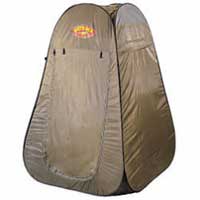 The personal hygiene items required for camping are not as obvious as you might think. It's a fun an interesting exercise to keep track of all the various things you use to maintain that body of yours. Things like toothpaste, soap, toilet paper, and combs, brushes, clippers and files abound. It is surprising, if not staggering, how much stuff we use, although much of it is not necessary. Of course, this will vary a great deal from one person to the next. Still you need to make decisions that address what you really need and minimize the extras. Outdoor conditions will dictate certain items like sun block or lip balm but lip stick and hair spray are even somewhat beyond optional.
The personal hygiene items required for camping are not as obvious as you might think. It's a fun an interesting exercise to keep track of all the various things you use to maintain that body of yours. Things like toothpaste, soap, toilet paper, and combs, brushes, clippers and files abound. It is surprising, if not staggering, how much stuff we use, although much of it is not necessary. Of course, this will vary a great deal from one person to the next. Still you need to make decisions that address what you really need and minimize the extras. Outdoor conditions will dictate certain items like sun block or lip balm but lip stick and hair spray are even somewhat beyond optional.
When it comes to bathroom needs, most of us guys can manage just fine with a shovel and a roll of toilet paper but the ladies are likely going to want something a little more discreet. There are some fairly simple commercially available items that can facilitate that effort. Or you can configure a tarp around some trees in an out of the way place.
ladies are likely going to want something a little more discreet. There are some fairly simple commercially available items that can facilitate that effort. Or you can configure a tarp around some trees in an out of the way place.
If you have big campouts with many people it is generally much better to contract porti-potties with a local firm.
Shelter and sleeping
 Well obviously us tent campers are partial to tents by definition. With tents and sleeping bags quality is a real issue as there are all possibilities from arctic rated to total garbage. My quality rule is based on how much I use it. If it is something I use very regularly I'll get the best quality I can get. Somewhat regularly I'll go with medium quality and if I use it rarely then I'll go with whatever is cheap but gets me by. Having said that though, I don't think I have ever regretted getting the best quality of anything. Unfortunately, I can't always afford to do that.
Well obviously us tent campers are partial to tents by definition. With tents and sleeping bags quality is a real issue as there are all possibilities from arctic rated to total garbage. My quality rule is based on how much I use it. If it is something I use very regularly I'll get the best quality I can get. Somewhat regularly I'll go with medium quality and if I use it rarely then I'll go with whatever is cheap but gets me by. Having said that though, I don't think I have ever regretted getting the best quality of anything. Unfortunately, I can't always afford to do that.
Additionally, there are other necessities like chairs, padding, cots, ice chest 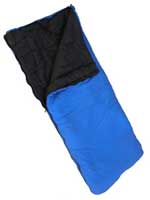 etc.. My camping tip here is to let things come together over time. If you try to figure out what you need from a camping catalogue, you might find it gets expensive real fast and I'll bet you end up with stuff you don't need.
etc.. My camping tip here is to let things come together over time. If you try to figure out what you need from a camping catalogue, you might find it gets expensive real fast and I'll bet you end up with stuff you don't need.
Your quality camping tip is to examine seams, zippers and poles when selecting equipment. If they are tough, chances are things will last. And while products reviews can be useful, there are entire review web sites designed basically to achieve search engine placement and even sell you products without regard to the true product quality. In other words, take reviews with a grain of salt, as some are paid for by unscrupulous companies who even pay for negative reviews for competitive products.
Food and water ( the kitchen )
 This is the place that makes you or breaks you when it comes to camping more often. The camping kitchen is hard because it requires so much stuff to do even a little bit of cooking. And it is just a major hassle to try to round up all that stuff every time you want to go camping.
Therefore, it is highly recommend that you invest in a good chuck box as soon as you figure out that you like camping. The idea is that it will store all those small easy to forget items on your camping checklist like the spatula, can opener and matches. And make sure your grub box will set up to give you work surfaces and utility features too.
This is the place that makes you or breaks you when it comes to camping more often. The camping kitchen is hard because it requires so much stuff to do even a little bit of cooking. And it is just a major hassle to try to round up all that stuff every time you want to go camping.
Therefore, it is highly recommend that you invest in a good chuck box as soon as you figure out that you like camping. The idea is that it will store all those small easy to forget items on your camping checklist like the spatula, can opener and matches. And make sure your grub box will set up to give you work surfaces and utility features too.
Camp Cooking Gear
Cooking outside can be done in any number of ways. Cooking 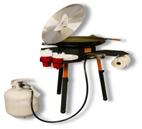 on and in a fire is probably and essential skill we should all have. You can get some ideas along those lines at our camping recipes web-page. I have been known to take my BBQ grill with me especially for those big group campouts. Additionally, there are any number of camping stoves available. Here is a high-tech version of a plow disc cooker. Never done this but I am guessing it would be a great piece of camp cooking equipment to have for getting tasty camping meals cooked real fast.
on and in a fire is probably and essential skill we should all have. You can get some ideas along those lines at our camping recipes web-page. I have been known to take my BBQ grill with me especially for those big group campouts. Additionally, there are any number of camping stoves available. Here is a high-tech version of a plow disc cooker. Never done this but I am guessing it would be a great piece of camp cooking equipment to have for getting tasty camping meals cooked real fast.
I hope that helps give you a way to approach the camping gear and equipment problem. My whole point is that your camping equipment list is really up to you and the ones you camp with. So as always, I am just trying to give you 'a' way to look at things, not necessarily 'the' way to look at things.
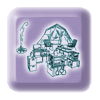 Basic Tips
Basic Tips Camping Tips
Camping Tips Vacations
Vacations